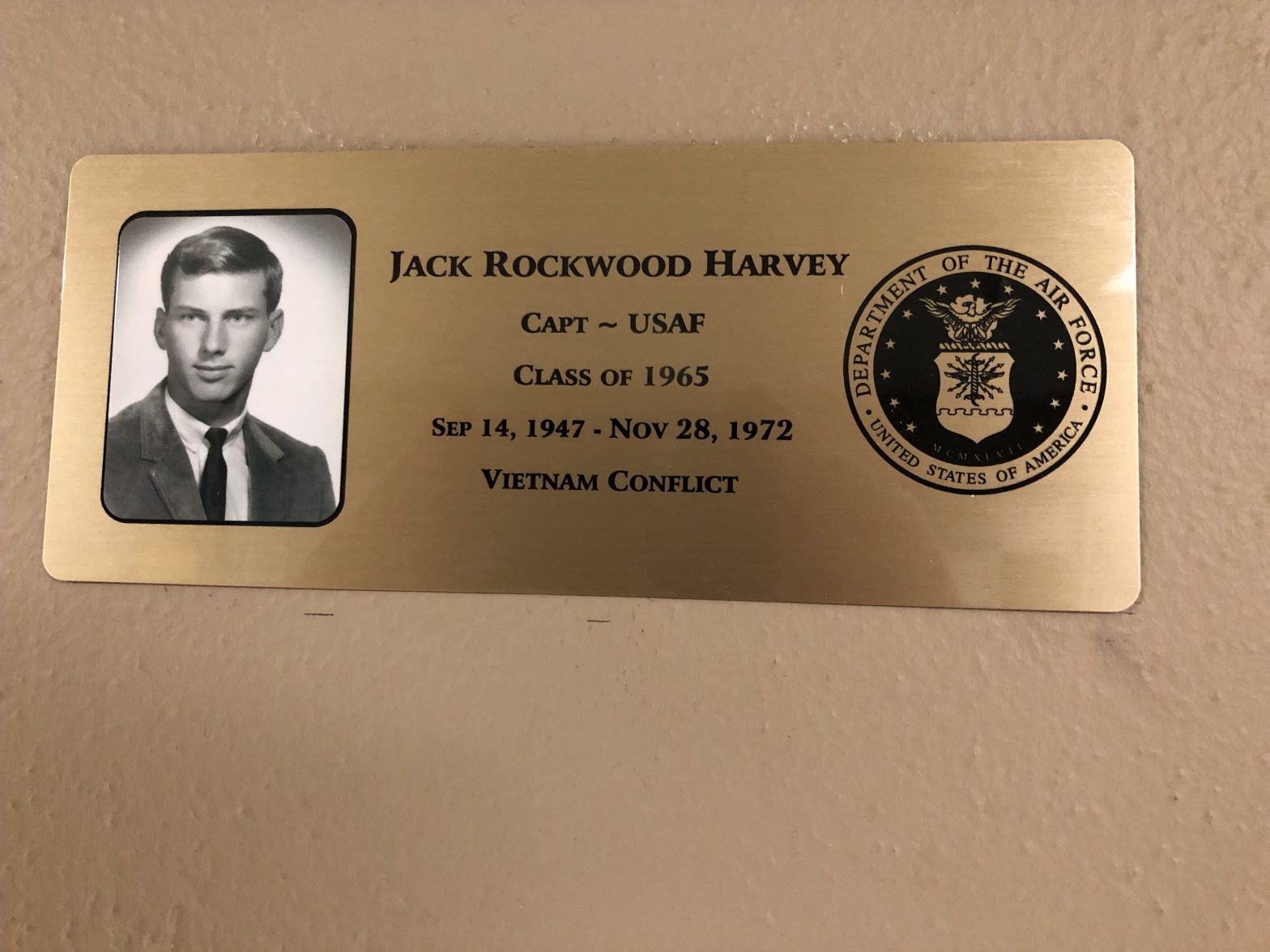![Jack R. Harvey, an Air Force pilot whose fighter jet went down over Vietnam in 1972, is remembered on a memorial wall at Choctawhatchee High School along with other graduates who gave ther lives in service to their country. [JIM THOMPSON/DAILY NEWS]](http://127.0.0.1/wordpress/wp-content/uploads/2022/01/ghows-DA-62967ab3-9adf-5c15-e053-0100007fd6ae-2d0a7b55-scaled.jpeg)
CRESTVIEW — An Air Force pilot whose fighter jet went down over South Vietnam in 1972 and whose body was never recovered, is the latest candidate for inclusion on the Okaloosa County Veterans Memorial.
The memorial's board of directors is now searching for family members in preparation for having Jack R. Harvey's name added to the memorial.
Crestview Mayor David Cadle, a board member, said efforts to find Harvey's relatives began recently when one of his Choctawhatchee High School classmates contacted him to say Harvey's name should be on the monument. Harvey, who moved to Fort Walton Beach in the early 1960s with his parents — his father was a military officer — was a 1965 Choctaw graduate.
Cadle could not recall the classmate's name, but there is ample evidence that Harvey has earned a place on the Okaloosa memorial. His name is inscribed on the Vietnam Veterans Memorial in Washington, D.C., and a plaque honoring his sacrifice is part of a memorial wall at Choctaw.
The Okaloosa memorial's board consults a variety of sources to determine whether a local combat death can be included on the memorial. As a final step, the family is contacted before the name is inscribed.
"We don't want to put any name of the wall without the family's knowledge," Cadle said.
He is optimistic that a member of Harvey's family will be found.
The newspaper's efforts to track down Harvey's family have been unsuccessful thus far.
Meanwhile, official documents paint a relatively clear — if somewhat frustrating — picture of a crash that left a grieving widow searching for answers about her husband's fate.
Records from the Air Force and the Department of Defense indicate that on the morning of Nov. 28, 1972, 24-year-old 1st Lt. Jack R. Harvey was piloting an F-4D Phantom from Udorn Royal Thai Airfield to Da Nang Air Base. Also on board was Capt. Bobby Jones, a flight surgeon. The flight was meant to provide Jones with some flying hours to maintain his flight surgeon status, and to ferry baggage to aircrews in Da Nang.
The F-4D, dubbed Hunter 11, left Udorn at 9:04 a.m. A little more than 40 minutes later, air traffic controllers turned the plane over to approach controllers at Da Nang. At an estimated 20 miles west of Da Nang, it disappeared from radar, and controllers at Da Nang reported that they had never established contact with the fighter jet.
Hunter 11 went down in an area of heavy enemy activity in deteriorating weather, records show. A search and rescue effort was initiated, but the weather concerns and enemy activity forced its quick cancellation.
Subsequently, aircraft were instructed to watch and listen for the downed F-4D. About 10 hours after Hunter 11 disappeared, two aircraft reported hearing two beeper signals and three "Mayday" calls. Over the next two days, aircraft would report faint beeper signals, but nothing further.
Wreckage of what was believed to be Hunter 11 eventually was spotted in a mountainous and heavily wooded area, but continued North Vietnamese control prevented any additional reconnaisance.
Records show Harvey's wife, Barbara, was immediately and keenly interested in her husband's fate. The couple had met at Choctaw, were married in 1967, and had a daughter who was just 3 at the time of her father's crash.
A Dec. 1, 1972, notation in official records indicates Barbara Harvey had contacted Eglin Air Force Base to seek information on Air Force rescue efforts.
Harvey reportedly got in touch with a lieutenant colonel with the 39th Aerospace Rescue and Recovery Squadron. According to records of the crash, she "requested that someone … brief her on normal rescue operations." The Eglin officer was given permission to brief Harvey, but was "cautioned … to be careful not to make any promises or anything of that sort."
Just a few months later as the first American prisoners of war were coming home from Vietnam, Barbara Harvey would express the frustration felt by her and other military spouses whose husbands were then listed as missing in action.
"I just hope that people don't think the war's over. It's not over, not for us," Harvey said in an April 1973 story in the Playground Daily News, then the local newspaper.
In November 1973, the Air Force conducted a mandated review of Harvey's crash. At that time, it was "concluded that while it was possible that Captain Harvey (he was promoted to captain subsequent to the 1972 crash) did not perish when his aircraft was lost, the likelihood that he was still alive in 1973 could no longer be reasonably considered. This was based on the fact that … sufficient time had elapsed during which it is believed some word would have been received if he were still alive."
Reviews of Harvey's crash would continue for the next six years, even as Barbara Harvey pressed the Air Force for information on her husband's status.
Harvey's status was changed to "deceased" in January 1980, according to official records.

This article originally appeared on Crestview News Bulletin: Officials seek family of downed Vietnam pilot
